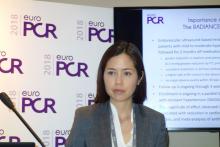The primary endpoint was the change in daytime ambulatory systolic blood pressure at 2 months’ follow-up post procedure in an intent-to-treat analysis. The RDN group had an 8.5–mm Hg reduction from baseline, compared with a 2.2–mm Hg reduction in sham-treated controls.
In a per protocol analysis excluding the five patients in the RDN group and 13 controls who required antihypertensive medication during the 2-month follow-up period, the average reduction in daytime ambulatory SBP was 8.5 mm Hg in the RDN group and 0.1 mm Hg in controls.
Similar statistically significant and clinically important placebo-controlled reductions in blood pressure were seen in all other endpoints, including 24-hour ambulatory, office, and home blood pressure.
“To put this in context, the magnitude of effect observed both on ambulatory blood pressure as well as office blood pressure is comparable with differences in blood pressure associated with reduction in cardiovascular events in population-based studies and meta-analyses of antihypertensive medication randomized trials,” Dr. Mauri observed.


